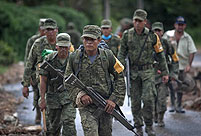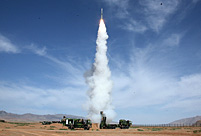The story of a boy who said "thank you" to the train conductor who helped his mother give birth to him 12 years ago has become popular in the railway sector in Southwest China's Sichuan province.
On Dec 20, 2001, Feng Xifen, a young migrant worker from Longchang county, Sichuan, was taking the K191 train from Guangzhou, capital of Guangdong, to Chengdu.
“She was on the way back to home to give birth to our son. She wasn't due to give birth for another 10 days, and she was accompanied only by her teenage niece. But unexpectedly she began to go into labor on the train,” said her husband, Huang Mingjie.
As the next station was more than an hour away, Zhao Dehui, the train conductor, and her colleagues had to turn a hard sleeper compartment into a makeshift delivery room.
“They looked for medics who could help through radio, but there were no medics on the train. Zhao and several female members of the crew had to serve as midwives,” said Cao Jun, an official at the Chengdu Railway Administration.
“Very soon, a boy was born. After she learned the father's surname, Zhao suggested the boy be named Huang Chesheng (meaning “Huang was born on a train”),” he said.
Huang Mingjie was overjoyed when he found out both his wife and newborn son were safe at the Longchang Railway Station.
“I forgot to ask for the conductor's name when we left in a hurry. I only remember she was in her 30s and was very pretty,” he said.
Preoccupied with how to earn a living to support the family, Huang Mingjie did not have time to search for the conductor to thank her face to face.
During Spring Festival this year, Huang Chesheng, a sixth-grader at a primary school in Luzhou, learned from his father the origin of his name when he was assigned by his teacher to write a composition titled “How I got my name”.
“I decided to look for the conductor and taught my son to be grateful to the people who help him,” Huang Mingjie said.
As his efforts to find the conductor proved to be in vain, he turned to Chengdu's Southwest Railway Newspaper for help on Aug 18.
Moved by the story, Yao Hua, a journalist with the paper, helped Huang Mingjie look for the conductor through Sino Weibo, the Twitter-like micro blog, and WeChat, the group chat platform. The story quickly became popular among passengers and officials at the Chengdu Railway Administration.
“As more than 100 babies are born on trains every year, more than 10 conductors have served as midwives on train K191, and 12 years is a long time, so we were not able to determine who helped the Huangs at first,” Cao said.
But nine days later, Zhao was found to be the conductor the Huangs were looking for. Zhao, who is now retired and lives in Yibin, Sichuan, was excited that the Huangs had looked for her for more than a month.
She said: “Train K191 was the most important means of transportation for Sichuan farmers to go to Guangdong and work as migrant workers. I helped many pregnant farmers give birth on the train and never thought much about it.”
On the morning of Sept 13, Zhao, accompanied by Yao, arrived at a teahouse run by Huang Mingjie in his home village in Luzhou.
Embracing Feng, Zhao said in tears: “It has been more than a decade and I am a pensioner. But you still remember how I helped you and you looked for me.”
At noon, Huang Chesheng returned from school. Zhao was delighted to find that he was as tall as she was. As she touched the boy's head, Zhao offered him a train toy and said: “I would like to adopt you as my son.”
Huang Chesheng knelt down in front of Zhao and accepted her offer to become his adopted mother.
Then, he read to her the composition he wrote during Spring Festival, according to the Chengdu Economic Daily.
Zhao, elated from their meeting, asked Huang Chesheng to pay forward the kindness she showed him on the day he was born.
 Storms leave 97 dead, 58 missing in Mexico
Storms leave 97 dead, 58 missing in Mexico New model of indigenous surface-to-air missiles testfired
New model of indigenous surface-to-air missiles testfired  118.28-carat diamond to be auctioned in HK
118.28-carat diamond to be auctioned in HK Maternal love under streetlight
Maternal love under streetlight Naked foreign student sits in the middle of a road in Haikou
Naked foreign student sits in the middle of a road in Haikou  Colorful Yunnan: Enjoy the natural beauty
Colorful Yunnan: Enjoy the natural beauty Harbin named Chinese city with most beautiful women
Harbin named Chinese city with most beautiful women New college students' military training in Guangzhou
New college students' military training in Guangzhou Rugby girls
Rugby girls PLA's 38th Group Army conduct training
PLA's 38th Group Army conduct training Residences of the royal house of Savoy
Residences of the royal house of Savoy The last days of Wan Aihua
The last days of Wan Aihua Highlights at 12th National Games of China
Highlights at 12th National Games of China Beijing Film Academy welcomes freshmen
Beijing Film Academy welcomes freshmen Large mahjong party sets new world record
Large mahjong party sets new world recordDay|Week|Month